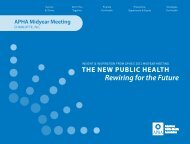EVIDENCE
missingevidence-digitalpdf-singlepages_2016
missingevidence-digitalpdf-singlepages_2016
You also want an ePaper? Increase the reach of your titles
YUMPU automatically turns print PDFs into web optimized ePapers that Google loves.
Case study 1<br />
THE EFFECTS OF MINIMUM ALCOHOL PRICING<br />
The allegation<br />
According to Dr Sarah Wollaston MP, the Department of Health (DH) delayed the publication<br />
of a study of the effects on alcohol abuse of a minimum price compared with a ban on below<br />
cost sales, until the day of a government policy announcement. 4<br />
Timeline<br />
Mar 2012<br />
Nov 2012<br />
- Jul 2013<br />
Mar 2013<br />
Jul 2013<br />
Jan 2014<br />
Sep 2014<br />
Government published its alcohol strategy, undertaking to introduce a minimum price per unit<br />
of alcohol. 5<br />
The government launched a consultation on delivering this strategy 6 and asked researchers<br />
at University of Sheffield to model the impact of a minimum unit price.<br />
Researchers provided a draft report to the Home Office, DH and the Treasury. Asked to model<br />
the effect of a 45p minimum price, they estimated it would “reduce alcohol consumption by 1.6%,<br />
leading to approximately 625 fewer deaths per year due to alcohol, 23,700 fewer hospital admissions<br />
and 34,200 fewer crimes” after ten years. They compared this with the effects of banning the sale<br />
of alcohol below cost price, which their model shows would be far less effective at reducing problem<br />
drinking: it was estimated to “reduce consumption by just 0.04%, leading to around 15 fewer deaths,<br />
500 fewer hospital admissions and 900 fewer crimes related to alcohol per year.” 7<br />
On the same day as the Sheffield study was released, the government rejected a minimum price.<br />
The crime prevention minister announced that government opted instead for a ban on below cost sales.<br />
The authors of the research released a statement, saying, “The government did not bar [us] from<br />
releasing the reports — we had agreed from the outset that we would align our publication with<br />
the government’s response to the alcohol strategy consultation to ensure we provided their impact<br />
assessment of minimum unit pricing with the most up-to-date evidence possible. Having produced<br />
additional analyses on below cost selling in June, a further consideration was that if these were<br />
published directly before the government’s announcement that could be considered a de facto<br />
announcement of government policy.”<br />
Sheffield researchers published their comparative study in the BMJ. 8<br />
How were government policy and public debate affected?<br />
The government’s 2012 strategy said that a minimum price of 40p per unit “could mean 50,000 fewer crimes each year<br />
and 900 fewer alcohol-related deaths a year by the end of the decade.” In the interim it changed its mind. Responding<br />
to the Sheffield study and to other evidence submitted to the consultation on that strategy, the government said<br />
the consultation had “not provided evidence that conclusively demonstrates that minimum unit pricing will actually<br />
do what it is meant to: reduce problem drinking without penalising all those who drink responsibly.” Citing an “absence<br />
of that empirical evidence,” they said a minimum price was being delayed “until we have conclusive evidence that it will<br />
be effective.” 9 Failing to publish the Sheffield study ahead of announcing a change of government policy prevented<br />
the public from judging whether this change was justifiable.<br />
4 Wollaston, S (2014)<br />
5 HM Government (2012)<br />
6 Home Office (2012)<br />
7 Holmes, J (2014)<br />
8 Brennan, A et al (2014)<br />
9 Home Office (2013)<br />
18<br />
SECTION 3: REASONS FOR THE DELAYED PUBLICATION OR WITHHOLDING OF GOVERNMENT RESEARCH



